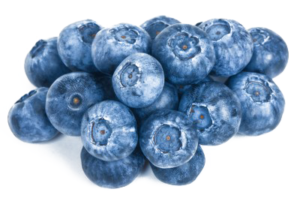 Once again a study finds that eating berries (this time blueberries) is associated with health benefits - that the blueberries improved both blood vessel functioning and blood pressure. This multi-part European study was conducted on both humans and mice. The researchers specifically looked at what component of blueberries had the beneficial effects on blood pressure and came to the conclusion that it was the anthocyanins in the blueberries. Anthocyanins are the blue, violet, or red flavonoid pigments found in berries and other plants.
Once again a study finds that eating berries (this time blueberries) is associated with health benefits - that the blueberries improved both blood vessel functioning and blood pressure. This multi-part European study was conducted on both humans and mice. The researchers specifically looked at what component of blueberries had the beneficial effects on blood pressure and came to the conclusion that it was the anthocyanins in the blueberries. Anthocyanins are the blue, violet, or red flavonoid pigments found in berries and other plants.
How much did the researchers find to be beneficial in the study? 2 cups or 200 g blueberries daily for one month. The study participants drank blueberry juice, but the assumption is that eating whole blueberries has the same beneficial effect.The researchers found that the lowering of blood pressure (5 mmHg) is similar to what is commonly observed with blood pressure lowering medication (e.g. ACE inhibitors) in patients.
By the way, research finds health benefits from eating a variety of berry types and richly colored fruits and vegetables (e.g. better brain functioning, lower blood pressure, lowering of cholesterol levels). Not only are the micronutrients different, but also the microbial species which we ingest (this is good!). So don't eat just one kind of berry - eat them all!
From a press release published by King's College London: The 'blue' in blueberries can help lower blood pressure
A new study published in the Journal of Gerontology Series A has found that eating 200 g of blueberries every day for a month can lead to an improvement in blood vessel function and a decrease in systolic blood pressure in healthy people.
Researchers from King’s studied 40 healthy volunteers for one month. They were randomly given either a drink containing 200 g of blueberries, or a matched control drink daily.The team monitored chemicals in volunteers’ blood and urine as well as their blood pressure and flow-mediated dilation (FMD) of the brachial artery: a measure of how the artery widens when blood flow increases, which is considered a sensitive biomarker of cardiovascular disease risk.
In a further study, researchers compared the effects of a blueberry drink with those of purified anthocyanins, a type of phytochemical responsible for the blue, red, pink and purple colour of some fruits and vegetables such as berries and red grapes. They also compared this with control drinks containing either similar levels of fiber, mineral or vitamins found in blueberries.
They found that: - Effects on blood vessel function were seen two hours after consumption of the blueberry drinks and were sustained for one month even after an overnight fast. - Over the course of the month, blood pressure was reduced by 5mmHg. This is similar to what is commonly seen in studies using blood pressure lowering medication. - The drinks containing purified anthocyanins led to improvements in endothelial function. Endothelial cells act as a barrier between the blood or lymph and the surrounding body tissue, as well as playing key roles in blood clotting and regulating blood pressure. - Neither the control drink, the control with fibre or the control with minerals and vitamins had a significant effect on FMD at two and six hours after consumption.
Lead researcher Dr Ana Rodriguez-Mateos from the Department of Nutritional Sciences at King’s said: “Although it is best to eat the whole blueberry to get the full benefit, our study finds that the majority of the effects can be explained by anthocyanins.
